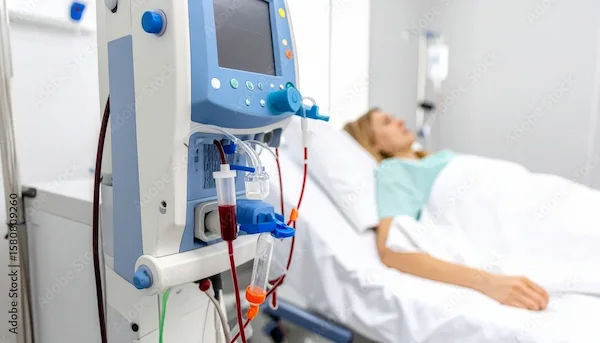Understanding Glaucoma: Symptoms, Causes, and Treatment
Understand glaucoma, a serious eye condition that can lead to vision loss. Learn about its symptoms, causes, types, and available treatment options to help protect your eye health and preserve vision .

Written by Dr. Shaik Abdul Kalam
Reviewed by Dr. Vasanthasree Nair MBBS
Last updated on 25th Aug, 2025

Introduction
Glaucoma is a serious eye condition that can lead to vision loss if not detected and treated early. Often called the "silent thief of sight," it usually develops slowly without noticeable symptoms until significant damage has occurred. This article will help you understand glaucoma, its symptoms, causes, and available treatments, along with practical tips to protect your vision.
What is Glaucoma?
Glaucoma is a group of eye diseases that damage the optic nerve, which connects the eye to the brain. This damage is often caused by high pressure inside the eye (intraocular pressure or IOP). Over time, untreated glaucoma can lead to permanent vision loss or blindness.
There are two main types of glaucoma:
1. Open-angle glaucoma: The most common type, where the eye’s drainage canals become clogged over time, leading to gradual vision loss.
2. Angle-closure glaucoma: A less common but more severe type where the drainage angle suddenly gets blocked, causing a rapid increase in eye pressure. This is a medical emergency.
Symptoms of Glaucoma
Glaucoma often progresses without early warning signs, but some symptoms may appear depending on the type:
Open-Angle Glaucoma Symptoms:
Gradual loss of peripheral (side) vision
Tunnel vision in advanced stages
Blurred vision
Angle-Closure Glaucoma Symptoms (Sudden Onset):
Severe eye pain
Headache
Nausea or vomiting
Sudden blurred vision
Seeing halos around lights
Redness in the eye
If you experience sudden eye pain or vision changes, seek emergency medical care immediately.
Consult Top Specialists for Personalised Tips
What Causes Glaucoma?
The exact cause of glaucoma is not fully understood, but high intraocular pressure (IOP) is a major risk factor. Other contributing factors include:
Age (over 60 years)
Family history of glaucoma
High eye pressure
Diabetes or high blood pressure
Eye injuries or surgeries
Long-term steroid use
Extreme nearsightedness or farsightedness
How Glaucoma Affects Your Vision?
Glaucoma damages the optic nerve, which transmits visual signals to the brain. Without treatment, it leads to:
Peripheral vision loss (side vision)
Blind spots in advanced stages
Complete blindness if left untreated
Since vision loss from glaucoma is irreversible, early detection and treatment are crucial.
Diagnosis and Tests
An eye specialist (ophthalmologist) can diagnose glaucoma through:
1. Tonometry: Measures eye pressure.
2. Ophthalmoscopy: Examines the optic nerve.
3. Perimetry (Visual Field Test): Checks for vision loss.
4. Gonioscopy: Examines the eye’s drainage angle.
5. Optical Coherence Tomography (OCT): Scans the optic nerve for damage.
Regular eye check-ups are essential, especially if you’re over 40 or have risk factors.
Treatment Options for Glaucoma
While glaucoma cannot be cured, treatments can slow or prevent further vision loss. Options include:
1. Eye Drops
Prostaglandins: Increase fluid drainage.
Beta-blockers: Reduce fluid production.
Alpha agonists: Lower eye pressure.
2. Oral Medications
Used if eye drops aren’t effective.
3. Laser Therapy
Trabeculoplasty: Improves drainage in open-angle glaucoma.
Iridotomy: Creates a small hole to relieve pressure in angle-closure glaucoma.
4. Surgery
Trabeculectomy: Creates a new drainage channel.
Glaucoma Drainage Implants: Small tubes to drain fluid.
Your doctor will recommend the best treatment based on your condition.
Lifestyle Tips to Manage Glaucoma
While medical treatment is essential, these lifestyle changes can help protect your vision:
Get regular eye check-ups: Early detection is key.
Exercise moderately: Avoid intense workouts that increase eye pressure.
Eat a healthy diet: Include leafy greens, fish, and nuts (rich in antioxidants).
Limit caffeine: High intake may raise eye pressure.
Protect your eyes: Wear sunglasses and avoid eye injuries.
Manage stress: High stress can impact eye pressure.
Sleep with your head elevated: Helps reduce nighttime eye pressure.
When to See a Doctor?
Consult a doctor if you experience:
Sudden eye pain or redness
Blurred vision
Halos around lights
Severe headaches with nausea
Conclusion
Glaucoma is a serious but manageable condition. Since symptoms often appear late, regular eye exams are crucial, especially if you have risk factors. Early treatment can save your vision and prevent blindness.
If you suspect glaucoma or need an eye check-up, consult an ophthalmologist today. Apollo24|7 offers expert eye care services—schedule a consultation or eye test to protect your vision.
Consult Top Ophthalmologists
Consult Top Specialists for Personalised Tips

Dr. Smriti Nagpal
Ophthalmologist
13 Years • MBBS , MS (Ophthalmology)
New Delhi
Sunshine mediclinic, New Delhi

Dr. Rajeev Gupta
Ophthalmologist
24 Years • MBBS, MS (Ophthalmology)
Ghaziabad
Om Eye & Gynae Centre, Ghaziabad
Dr. S Venkateswaran
Ophthalmologist
35 Years • MBBS, PGD (OPTHALMOLOGY)
Tiruvannamalai
Shiva Eye And General Hospital, Tiruvannamalai

Dr. Mridula V Amarnath
Ophthalmologist
12 Years • MBBS,MS (Opthalomology)
Bengaluru
Apollo Medical Center, Marathahalli, Bengaluru

Dr. Madhurjya Gogoi
Ophthalmologist
19 Years • MBBS, MD(AIIMS)
Guwahati
Apollo Excelcare Hospital, Guwahati
Consult Top Ophthalmologists

Dr. Smriti Nagpal
Ophthalmologist
13 Years • MBBS , MS (Ophthalmology)
New Delhi
Sunshine mediclinic, New Delhi

Dr. Rajeev Gupta
Ophthalmologist
24 Years • MBBS, MS (Ophthalmology)
Ghaziabad
Om Eye & Gynae Centre, Ghaziabad
Dr. S Venkateswaran
Ophthalmologist
35 Years • MBBS, PGD (OPTHALMOLOGY)
Tiruvannamalai
Shiva Eye And General Hospital, Tiruvannamalai

Dr. Mridula V Amarnath
Ophthalmologist
12 Years • MBBS,MS (Opthalomology)
Bengaluru
Apollo Medical Center, Marathahalli, Bengaluru

Dr. Madhurjya Gogoi
Ophthalmologist
19 Years • MBBS, MD(AIIMS)
Guwahati
Apollo Excelcare Hospital, Guwahati




